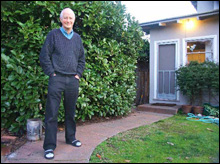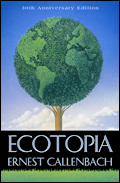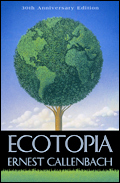In the afterword to the 30th-anniversary edition of his 1975 novel, Ernest Callenbach writes, “Looking back, it seems clear that Ecotopia was the first attempt to portray a sustainable society, and that this, more than its modest literary merit, explains its durability.” Sadly, there is no false humility in that statement.
Ecotopia is ostensibly about a secessionist Northwest — northern California, Oregon, and Washington — founded on ecological principles. In this independent land, cars are abolished, everybody recycles, and sewage is turned to fertilizer. More fundamentally, Ecotopia is a “stable-state” society, where old notions of economic progress are retired and “biological stasis” becomes the ultimate goal. That sounds good, as far as it goes; however, the vision is weighed down by so much extraneous cultural baggage — Marxism, paganism, free love, ritual warfare, communal living, abortion on demand, legalized drugs, gamelan orchestras — that readers coming to Ecotopia for the first time will find both more and less than they bargained for.
I say the novel is ostensibly about the Northwest because, in fact, all the action takes place in California, and most of it in the Bay Area. We see a good deal of Ecotopian San Francisco and Berkeley, but nothing at all of Ecotopian Portland or Seattle, let alone, say, Ecotopian Klamath Falls or Forks. The story is narrated by William Weston, a New York journalist, by way of his notebooks and dispatches — the first filed by an American reporter from inside the breakaway republic in 20 years. Weston’s stranger-in-a-strange-land observations are, by turns, ludicrously detailed (he dutifully reports that electric carving knives are unknown in Ecotopia) and impossibly obtuse, as when the reader is hit with this: “Thus the Ecotopian federal structure, which superficially resembles the small government bodies found under primitive capitalism, makes the most of its outlays on uncontroversial activities that benefit all citizens absolutely equally.”
Few novels can survive that kind of thing; yet, somehow, Ecotopia has thrived, having now sold nearly a million copies in nine languages. Were it otherwise, there would be no sense in reissuing the book — nor, indeed, in reviewing it — except perhaps as a cultural artifact. But even today, the novel is assigned reading for college courses in political science and environmental studies. You need only google “ecotopia” to get a glimmering of its far-reaching influence: there’s ecotopia.org, ecotopia.com, ecotopia.biz, ecotopia.co.uk, etc. And it may even be true that some pillars of the modern environmental movement were built upon Ecotopian ideals. Callenbach boasts that his book was an inspiration to the founders of the German Green Party, and Judi Bari’s Mendocino chapter of Earth First! was named after it. Whatever else you might say about Ecotopia, it can’t be dismissed as a relic.
The novel stands in sharp contrast to another enduring eco-classic from 1975, Ed Abbey’s wildly successful (and also Earth First!-inspiring) The Monkey Wrench Gang. As a writer, Abbey was in another league, but his sensibilities were also a world apart. While the two books share a deep disdain of progress (so-called), Abbey’s eco-saboteurs were not starry-eyed radicals so much as fed-up rednecks, beer-fueled Quixotes who leveled their lances at billboards and bulldozers and dams. While they aimed to merely throw a wrench in the works of industrial civilization, Callenbach conjured a model society — a City on a Hill, so to speak — where humans could live in balance with nature. As Callenbach recently told The San Francisco Chronicle, “Then, as now, people didn’t have easy hope, and Ecotopia served as a beacon.”
Therein lies both its appeal and its fatal weakness, for while Callenbach dared, at least, to envision human history as something other than a forced march to oblivion, his characters, stuck as they are within the utopian framework, seem like little more than the self-satisfied minions of the newly dawned Aquarius. Abbey’s desert rats may be doomed, but at least they’re heroic. The citizens of Callenbach’s republic, by contrast, display an eerie sameness that makes all human interaction in the book seem unsettlingly artificial, as if the body-snatchers had already come and gone, leaving behind only pod people. Hayduke may live, but he doesn’t live in Ecotopia.
This is not to say that the residents of this sovereignty don’t argue or act up. They do. Callenbach takes pains, in fact, to show us that the good people of Ecotopia are unrestrained in their emotions. One illustration of this involves a plate of cold eggs in a restaurant. When the indignant recipient of the tepid huevos raises a stink, the resulting row brings the place to a grinding halt as the aggrieved customer and the offended cook square off in front of the other diners. The drama ends not in bitterness or violence, however, but in hugs and tears and “many little smiles all around.” This is the way things go in Ecotopia — repeatedly, until the reader realizes that Ecotopians don’t so much interact as role-play. It’s life as group therapy.
Speaking of roles, free love has a starring one in Callenbach’s vision. His lucky narrator enjoys wild romps in forest shrines, anonymous threesomes in tents, even sex with the lovely and obliging nurse who tends to him in the hospital. (As porn clichés go, the Naughty Nurse has to be right up there with the Lusty Librarian.) After his Florence Nightingale manually “gets him off,” Weston happily reports to his readers back home, “The nurses are highly trained in a number of specialties unknown to ours, particularly massage, which they regard as important for stimulating the body’s recuperative powers.” That’s comical, to be sure, but given the unrelenting earnestness of the novel, it’s difficult to say whether or not the humor was intended.
Here’s how the sticky issue of race is addressed in the novel: blacks have voluntarily segregated themselves. Oakland thus becomes Soul City, an Afro-centric enclave where businesses are “more naturally collectivist than in the white areas” and which is a “heavy exporter of music and musicians, novels and movies and poetry.” Natch. Native Americans are at once prominent and scarce in Ecotopia; that is, they exist only as part of the idealized, pre-Columbian past, as noble savages. As such, Ecotopians are free to play Indian: they happily adopt faux-native names and hunt with bow and arrow; they say things like, “You’d never catch an Indian wearing a watch”; and, as they march to a ritual war game in Golden Gate Park, we read that the men “joked with a certain bravado … Tom quoted the old plains Indian saying: ‘It is a good day to die.'”
The evil of warfare has been ritualized as a way of dissipating its awful power and relegating it to the safe, if frightening, confines of ceremony. The scene, as Callenbach paints it, is unbridled neo-primitivism, complete with all the props: chanting, obsidian spears, cauldrons filled with potions, face paint. All that’s missing from the Tarzan fantasy are grass skirts and bones protruding from pierced septums. The charade ends when Weston is ritually speared in the side — the wound that lands him in the sexual-healing ward.
Before he can return home to New York, Weston is abducted on the orders of the president of Ecotopia, Vera Allwen. His benevolent captors spirit him away to a hot springs in the foothills. There, steaming in the baptismal waters, the last of his intellectual resistance — his “objective pseudo-think,” as he disparages it in his journal — melts away, and at long last, he is reborn. The scene ends as things inevitably do in Ecotopia: with hugs and tears and everyone “obviously very pleased with themselves.”

Ernest Callenbach in his Berkeley garden.
Photo: © 2005 Gregory Dicum.
Callenbach has called his book “politics fiction” (as opposed to science fiction), but he’s wide of the mark there. Aside from the occasional whiff of authoritarianism, there are no politics to speak of here. How could there be? The Ecotopian worldview is of such a cultish consistency, after all, that politics are superfluous. Moreover, in this Rousseauian world, people are all basically good. Evil is in exile, banished to the old world beyond the borders. With no need of politics, neither are there politicians. Allwen, the president, is really more of a high priestess, the therapist-in-chief. Weston notes with some alarm that his long-awaited meeting with her is “almost like a psychiatric interview” and later, after his conversion, reflects that she “must have seen what was going on in my mind when I didn’t know it myself.” Yeah, almost like the Bhagwan or Jim Jones. What the ending of Ecotopia makes clear, finally, is that Callenbach’s story is a religious parable, a Pilgrim’s Progress for the deep-ecology set. It’s a cult classic in the fullest sense.
If Callenbach is embarrassed by any of this 30 years on, he gives no indication in the new afterword. “Being the author of Ecotopia,” he writes from his home in Berkeley, “has been like being the parent of a talented child.” Fair enough. Parents should be proud of their offspring. But the rest of us ought to be a little more objective.



